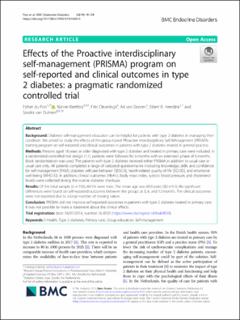| dc.contributor.author | du Pon, Esther | |
| dc.contributor.author | Kleefstra, Nanne | |
| dc.contributor.author | Cleveringa, Frits | |
| dc.contributor.author | van Dooren, Ad | |
| dc.contributor.author | Heerdink, Eibert | |
| dc.contributor.author | van Dulmen, Sandra | |
| dc.date.accessioned | 2020-03-12T11:06:17Z | |
| dc.date.available | 2020-03-12T11:06:17Z | |
| dc.date.created | 2020-02-20T13:34:21Z | |
| dc.date.issued | 2019 | |
| dc.identifier.citation | BMC Endocrine Disorders. 2019, 19 (1). | en_US |
| dc.identifier.issn | 1472-6823 | |
| dc.identifier.uri | https://hdl.handle.net/11250/2646530 | |
| dc.description | Open Access This article is distributed under the terms of the Creative Commons Attribution 4.0 International License which permits unrestricted use, distribution, and reproduction in any medium, provided you give appropriate credit to the original author(s) and the source, provide a link to the Creative Commons license, and indicate if changes were made. | en_US |
| dc.description.abstract | Background
Diabetes self-management education can be helpful for patients with type 2 diabetes in managing their condition. We aimed to study the effects of the group-based PRoactive Interdisciplinary Self-MAnagement (PRISMA) training program on self-reported and clinical outcomes in patients with type 2 diabetes treated in general practice.
Methods
Persons aged 18 years or older diagnosed with type 2 diabetes and treated in primary care were included. In a randomized controlled trial design (1:1), patients were followed for 6 months with an extension phase of 6 months. Block randomization was used. The patients with type 2 diabetes received either PRISMA in addition to usual care or usual care only. All patients completed a range of validated questionnaires (including knowledge, skills, and confidence for self-management [PAM], diabetes self-care behavior [SDSCA], health-related quality of life [EQ-5D], and emotional well-being [WHO-5]). In addition, clinical outcomes (HbA1c, body mass index, systolic blood pressure, and cholesterol levels) were collected during the routine diabetes checkups.
Results
Of the total sample (n = 193), 60.1% were men. The mean age was 69.9 years (SD = 9.1). No significant differences were found on self-reported outcomes between the groups at 0, 6, and 12 months. The clinical outcomes were not reported due to a large number of missing values.
Conclusion
PRISMA did not improve self-reported outcomes in patients with type 2 diabetes treated in primary care. It was not possible to make a statement about the clinical effects. | en_US |
| dc.language.iso | eng | en_US |
| dc.rights | Navngivelse 4.0 Internasjonal | * |
| dc.rights.uri | http://creativecommons.org/licenses/by/4.0/deed.no | * |
| dc.title | Effects of the Proactive interdisciplinary self-management (PRISMA) program on self-reported and clinical outcomes in type 2 diabetes: a pragmatic randomized controlled trial | en_US |
| dc.type | Peer reviewed | en_US |
| dc.type | Journal article | en_US |
| dc.description.version | publishedVersion | en_US |
| dc.rights.holder | © The Author(s). 2019 | en_US |
| dc.source.volume | 19 | en_US |
| dc.source.journal | BMC Endocrine Disorders | en_US |
| dc.source.issue | 1 | en_US |
| dc.identifier.doi | 10.1186/s12902-019-0466-0 | |
| dc.identifier.cristin | 1796127 | |
| cristin.ispublished | true | |
| cristin.fulltext | original | |
| cristin.qualitycode | 1 | |

